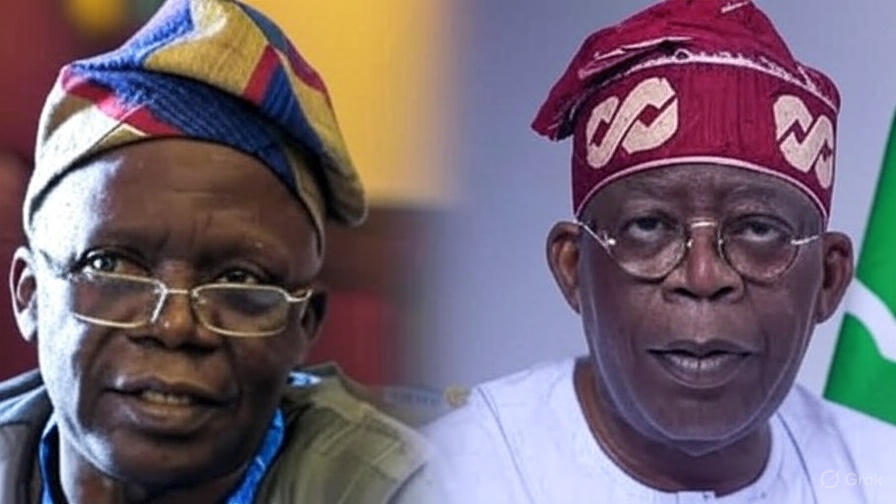
Daniel Otera
As inflation continues to erode household incomes and more Nigerians struggle to afford daily necessities, Senior Advocate of Nigeria (SAN) and human rights lawyer, Femi Falana, has criticised the Federal Government over what he termed “religiously implemented neoliberal policies” that are deepening poverty and squeezing out Nigeria’s middle class.
Appearing on Channels Television’s Politics Today on Monday, Mr Falana warned that President Bola Tinubu’s economic policies—particularly the removal of fuel subsidies and the floating of the naira—have exacerbated hardship for millions across the country.
“I have seen the President ask APC governors to ‘wet the ground’ more, but as far as the masses are concerned, things are getting tougher by the day,” Falana said. “Because of the religious implementation of neoliberal policies by the government, poverty is on the ascendancy.”
Since the removal of petrol subsidies in May 2023, fuel prices have surged nationwide. The sharp increase placed fresh strain on commuters, businesses, and food distribution chains already burdened by rising inflation.
The Central Bank of Nigeria’s currency unification policy, implemented in June 2023, added further pressure. At the time, the naira was trading at ₦460 to the dollar. By August 2025, the official exchange rate had weakened to over ₦1,500/$1 more than triple its pre-reform value.
Falana described these IMF and World Bank-endorsed policies as “dangerous” to economic equality, noting that:
“The economic programmes are very rosy for the rich, for the elite, but the majority of our people are going through excruciating poverty. People are hungry. Many are about to withdraw their children from school. The middle class is collapsing under the weight of these harsh reforms.”
He reiterated his call for Nigeria to explore alternative economic models, including alignment with global blocs like BRICS, which he says could offer more people-focused policy alternatives.
“Most Nigerians cannot afford three square meals a day. The middle class has been wiped out by the neoliberal policies of the government,” he lamented.
Recent data from the National Bureau of Statistics (NBS) supports Falana’s claims. As of May 2024, food inflation had surged to a record 41.1 percent. Over 133 million Nigerians—about 63 percent of the population—are now classified as multidimensionally poor, facing deprivation in healthcare, education, housing, and nutrition.
Basic food items such as rice, yam, and garri have nearly doubled in price within a year, forcing families to cut down on daily meals or resort to lower-quality alternatives.
Beyond subsidy removal and forex reform, Mr Falana raised alarm over the government’s renewed drive toward privatisation, particularly in strategic sectors like power and infrastructure.
“You cannot be addressing income inequality while handing over the nation’s resources to a few people in the name of privatisation,” he said.
Recent moves by the Tinubu administration include plans to concession four major international airports—Lagos, Abuja, Port Harcourt, and Kano—to private firms under long-term leases. Though officials say the initiative will boost efficiency, aviation unions have criticised the process for lacking transparency and failing to consult key stakeholders.
“This process has not been transparent,” a union representative told lawmakers during a recent public hearing. “We were not carried along, and the long-term implications for jobs and national security must be carefully considered.”
The Federal Government also approved Shell’s $2.4 billion divestment of onshore oil assets to a Nigerian consortium. While seen as a move to reduce environmental liabilities and attract local investment, civil society groups warn that weak oversight could expose oil-producing communities to further exploitation.
Mr Falana called for urgent government backing for social protection programmes that can cushion the impact of economic reforms on the most vulnerable.
Referencing the Social Investment Programme Agency Act, signed into law in 2023, he said the National Social Investment Programme (NSIP) which includes N-Power, school feeding schemes, and conditional cash transfers should be codified into law across states.
“To eradicate poverty, we must begin by implementing welfare laws,” Falana said. “President Tinubu should be able to persuade the governors to codify social investment programmes and enact them into law.”
However, recent findings by accountability watchdogs reveal challenges in NSIP implementation, including politicisation, delayed payments, and limited reach.
Despite public criticism, the Tinubu administration maintains that the reforms are necessary to stabilise the economy.
Speaking in July 2025, Minister of State for Finance, Dr Doris Uzoka-Anite, said the ₦4 trillion petrol subsidy bill in 2022 was unsustainable and disproportionately benefited the wealthy. The administration has promised to redirect subsidy savings toward infrastructure and human capital development.
The Central Bank Governor, Mr Olayemi Cardoso, also defended the naira float and foreign exchange unification policy, noting that the gap between official and parallel market rates has narrowed. Officials say the reforms are attracting renewed investor interest in Nigeria’s bond and equity markets.
Critics argue that liberalisation without adequate social safety nets could worsen inequality and fuel discontent. Labour unions and civil society groups have taken to the streets in recent months over the minimum wage debate and rising food and transport costs.
Mr Falana concluded his remarks with a stern warning:
“It is in the interest of the government to review its policies as soon as possible. We must go back to the drawing board and reduce foreign policy pressure, especially from the IMF and the World Bank. We cannot pretend that everything is fine. A government that fails to listen to its people is headed for trouble.”
